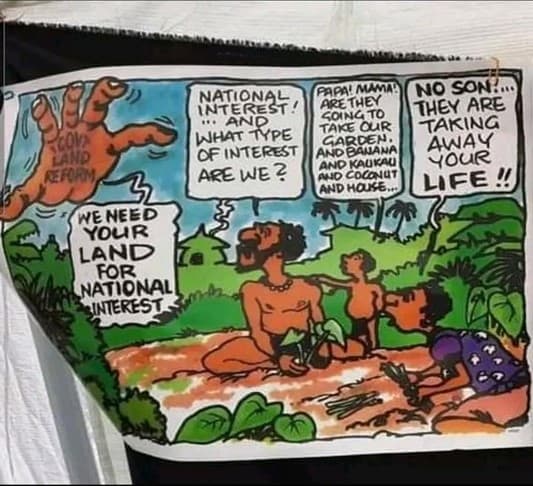Land Grabbing in PNG

Anua Melo Independent Blog | 11 May 2024
Land grabbing is a complex issue that has become a significant concern in developing countries, including Papua New Guinea (PNG). In PNG, land is typically held under customary tenure, with ownership and usage rights passed down through generations. However, in recent years, there have been reports of land grabbing in PNG, particularly through the Special Agricultural and Business Leases (SABLs), Integrated Land Groups (ILGs), and Special Economic Zones (SEZs) schemes.
SABLs were introduced in PNG as a way to encourage investment in the country’s agriculture sector. However, investigations by human rights groups have revealed that the SABL scheme has been used to facilitate land grabbing, with companies using the leases to gain control over customary land without the free, prior, and informed consent of the affected communities. A report by Global Witness found that more than 5 million hectares of land, or around 11% of the country’s total land area, had been granted under SABLs. The report also found that many SABLs had been granted in areas where there was little or no agricultural potential, raising questions about the true motives behind the scheme.
ILGs were introduced in PNG as a way to formalize customary land ownership and provide greater security of tenure for communities. However, there have been concerns that the ILG system has been exploited by outsiders, including companies, to gain control over customary land. A report by the Oakland Institute found that the ILG system was being used by companies to acquire land in PNG, often without the consent of the affected communities. The report also found that the registration process was often confusing and bureaucratic, leaving many communities vulnerable to exploitation.
SEZs were introduced in PNG as a way to promote economic development in designated areas of the country. However, there have been concerns that the SEZ scheme has been used to facilitate land grabbing, with companies using the incentives to gain control over customary land without the consent of the affected communities. A report by the International State Crime Initiative found that the SEZ scheme had been used to acquire large tracts of land in PNG, often with little or no compensation for the affected communities.
Land grabbing can have serious consequences for local communities, including loss of livelihoods, displacement, and environmental degradation.
